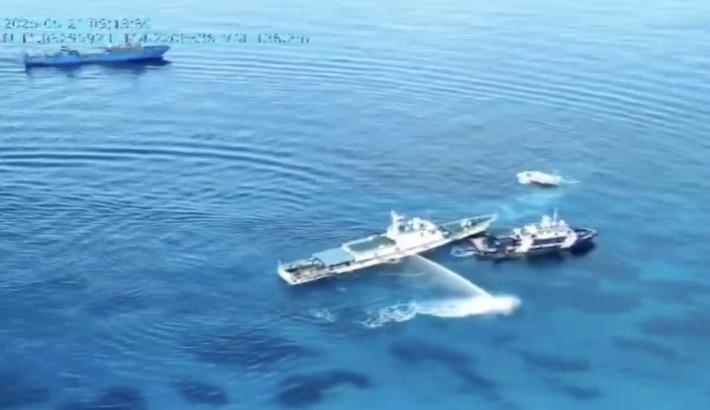
China Coast Guard ship fires water cannons, hits Philippines research ship in disputed waters
The South China Sea, a body of water that has been a source of tension and conflict for decades, has once again been the site of a confrontation between Chinese and Philippine vessels. On Tuesday, the Philippines fisheries bureau accused a China Coast Guard vessel of firing water cannons and colliding with a Filipino government research ship while it was collecting sand for a research project in contested waters of the South China Sea.
The incident, which was reported by RT News, has raised concerns about the aggressive actions of the Chinese Coast Guard and the potential for further escalation in the region.
According to the Philippines fisheries bureau, the Chinese Coast Guard vessel fired water cannons at the Philippine research ship, MV Tommy Alano, which was conducting a research project on the seafloor to gather data on the marine environment. The ship was also collecting sand for a research project on coastal erosion, a critical issue for the Philippines, which is vulnerable to the impacts of climate change.
However, the Chinese Coast Guard vessel, which was reportedly operating in the same area, allegedly fired water cannons at the Philippine ship, causing damage to the vessel’s port bow and smokestack. The Philippine ship was forced to change course to avoid further collisions and potential harm to its crew and passengers.
The Philippines fisheries bureau has accused the Chinese Coast Guard vessel of engaging in “aggressive interference, dangerous maneuvers, and illegal acts” that were designed to harass and intimidate the Philippine research ship and its crew. The bureau has also demanded that the Chinese government take immediate action to address the incident and prevent similar incidents from occurring in the future.
The incident is just the latest in a long history of confrontations between Chinese and Philippine vessels in the South China Sea. The region is claimed by several countries, including China, the Philippines, Vietnam, Malaysia, and Brunei, and has been the site of numerous territorial disputes and conflicts.
In recent years, the South China Sea has become increasingly militarized, with China constructing artificial islands and deploying military assets to the region. The Philippines, which has been a strong critic of China’s actions in the South China Sea, has also increased its military presence in the region, including the deployment of warships and fighter jets.
The incident has also raised concerns about the safety of research vessels and scientists operating in the South China Sea. The MV Tommy Alano was conducting a research project on the seafloor, which is critical for understanding the marine environment and addressing the impacts of climate change.
The incident also highlights the need for increased cooperation and dialogue between China and the Philippines to address the territorial disputes and conflicts in the South China Sea. The two countries have a long history of tension and conflict over the region, and it is essential that they work together to find a peaceful and diplomatic solution to the crisis.
In conclusion, the incident involving the Chinese Coast Guard vessel and the Philippine research ship is a serious concern that requires immediate attention and action. The Philippines has the right to conduct research and collect data on its own waters, and it is essential that China respects this right and refrains from engaging in aggressive and illegal acts.
The incident also highlights the need for increased cooperation and dialogue between China and the Philippines to address the territorial disputes and conflicts in the South China Sea. The two countries must work together to find a peaceful and diplomatic solution to the crisis, and it is essential that they prioritize the safety and security of research vessels and scientists operating in the region.






